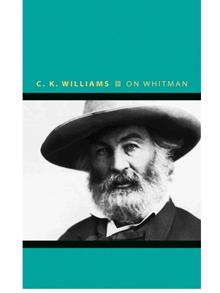‘On Whitman’ offers revealing inside look

 Publisher Princeton University Press recently released “On Whitman,” its second book of a series “Writers on Writers.” C.K. Williams was chosen to author the book.
Publisher Princeton University Press recently released “On Whitman,” its second book of a series “Writers on Writers.” C.K. Williams was chosen to author the book.
Williams has won the Pulitzer Prize, the National Book Award and many others.
His other recent works include: “The Singing,” “Wait” and “Poetry and Consciousness.”
Williams goes into depth about the ideas, concepts and imagination of Whitman.
“Who else, even from the perspective of the sexually-liberated culture of America in the ’60s and ’70s, did it better?” Williams said.
Himself also a poet, Williams is allowed by this book to study and analyze Whitman’s words, but also to translate his focus ofowriting while adding his own mastermind commentary.
Williams writes, “But how wildly exciting, how really exhalting it must have been to him when his poetry first offered him a way to see and record so much — it can feel like everything.
“Just reading it, the brilliance of the moments of inspiration are like raw synaptic explosions, like flashbulbs going off in the brain, in the mind: pop pop pop.”
Williams relays what Whitman’s contemplations were when considering moral conduct, sex and his personal life before and during his writings.
One emphasis is that these were ideas representing a counter culture of philosophical reform, and how Whitman was a beatnik of his time.
One particular work of Whitman’s that Williams seemed compelled to quote from, and rightfully so, is “Leaves of Grass,” a compilation of transcendentalist poems.
“On Whitman” is a wondrous and enchanting book.
It reveals sides of Whitman that may be left unconsidered, thus accomplishing his goal.
However, it seems a cheat, telling readers what to think about Whitman’s writing, rather than allowing readers to make their own discoveries.
It should be more of a supplemental read along with Whitman’s original works.
“Writers on Writers” spells out the mystery behind the artist, letting the masses be spoon fed.
Yet, the series is capable of immense potential because of the historical detail it provides about the author.
And, for the true followers of Whitman, it leads to instant euphoria.
The book costs about $20 and is worth the investment, but copies also can be found at most local libraries.
Whitman, and his works — dating back to the 1860s — still carry enough fervor for Williams to write about him today.
It proves that true genius is never lost or forgotten.
Rating: B